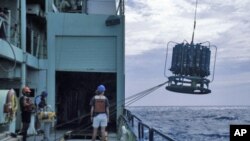The ocean’s capacity to take up the carbon humans put in the atmosphere is waning, according to a new study reported in the journal Nature Geoscience.
Previous studies, with often contradictory results, show that the amount of atmospheric carbon absorbed by the oceans varies from year to year.
University of Wisconsin oceanic sciences Professor Galen McKinley says her work - in collaboration with colleagues at the Lamont Doherty Earth Observatory of Columbia University and the Universite Pierre et Marie Curie in Paris - examines extended data analysis over time.
“As we look over that long period of data from 1981 and 2009 in the middle latitudes of the North Atlantic between south of the Gulf Stream and north of the equator there we see that the warming that is being driven by climate change is actually causing the carbon sink to be less efficient.”
A carbon sink is anything that absorbs more carbon that it releases. A warm ocean cannot absorb and hold as much carbon as cooler waters. Short-term climate variability had masked the decades-long pattern of carbon uptake, McKinley says.
“And so we are starting to see a distinguishable signal, whereby that warming of the ocean which is driven by climate change is making the carbon essentially less soluble in the ocean and is reducing the magnitude of that sink.”
Oceans now represent the largest natural carbon sink on Earth, absorbing about one-third of all the carbons humans put in the air by burning fossil fuels such as coal, oil and gas in power plants, cars and factories.
McKinley says the work suggests that the ocean’s capacity to mitigate climate change may be waning.
“This is a reason why we should be thinking even more about how we might reduce the amount of carbon going into the atmosphere because as these sinks become less efficient, the rate of climate warming will become faster and therefore the impacts on our civilization and our way of life will be even greater.”
The conditions the authors describe in the North Atlantic may be common in other oceans. McKinley says her team has already begun to test that hypothesis. She says it’s critically important that policy makers understand this trend, so they are able to make the kinds of decisions that can lessen the impact of climate change.




